In recent weeks, tensions have flared across the United Kingdom, leading to a heated national debate about law enforcement, political leadership, and the state of civil unrest. The narrative surrounding these events, particularly the characterization of those involved, has drawn significant criticism and raised concerns about the growing disconnect between the British government and its citizens.
Prime Minister’s Stance: A Tough Approach
Prime Minister Keir Starmer has taken a firm stance against the violence witnessed in various parts of the country, categorizing it as “far-right thuggery.” His unequivocal condemnation, while meant to assert control, has sparked a backlash from those who feel the root causes of these incidents are being oversimplified or ignored. Starmer’s focus on far-right elements as the primary agitators has been met with scepticism, particularly from those who argue that this label dismisses the broader anxieties driving many people to the streets.
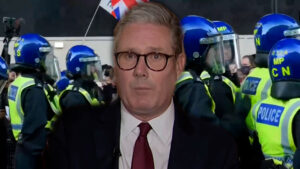
Voices of Dissent: A Growing Divide
Nigel Farage, leader of the UK Reform Party and a vocal critic of the current administration, argues that the government’s approach fails to address the underlying societal issues contributing to the unrest. Farage contends that the rise in far-right sentiments is a reaction to widespread fear and frustration, not the sole cause of the disorder. He emphasizes that the concerns fueling these reactions are shared by millions across the country, many of whom feel ignored or marginalized by the political establishment.
This sentiment is echoed by numerous citizens who have publicly confronted Prime Minister Starmer, accusing him of failing to protect the nation’s interests and properly address their concerns. These interactions highlight a deepening rift between the government and the people, with many feeling betrayed by the leaders they once supported.
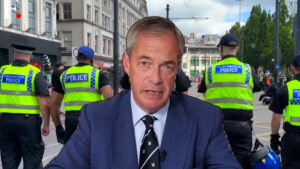
The Media’s Role: Manipulation or Reporting?
A significant aspect of the current debate revolves around the role of the media in shaping public perception. Critics argue that the media is complicit in misrepresenting the motives of those involved in protests, often labelling them as far-right extremists without acknowledging the legitimate fears that drive their actions. As one concerned citizen noted, the media’s portrayal often obscures the reality on the ground, depicting events as politically motivated rather than as expressions of genuine concern for the future.
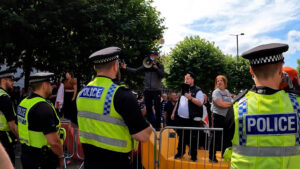
Law Enforcement Under Scrutiny
The conduct of law enforcement has also come under intense scrutiny, particularly in how they handle protests and public disturbances. Former Scotland Yard detective Peter Bleksley has pointed out the existence of “no-go areas” in certain neighbourhoods, where police presence is minimal due to fear or cultural clashes. He argues for a more assertive police force, one that unapologetically upholds the law and ensures public safety without pandering to specific communities.
Farage has further criticized what he sees as a breakdown in law and order under the current government, calling for stricter measures such as stop-and-search tactics and harsher sentences for those carrying weapons. The perception of “two-tier policing,” where different standards are applied depending on the community involved, has only fueled public distrust and resentment.
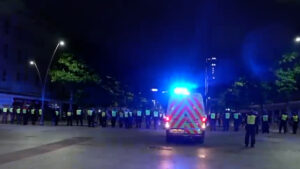
A Nation Divided: Where Do We Go From Here?
The escalating tensions across the UK reflect a nation grappling with deep-seated issues that go beyond simple political labels. As political commentator Isabel Oakeshott has pointed out, the government’s failure to acknowledge the legitimate concerns of ordinary citizens—particularly regarding immigration and community safety—has only exacerbated the divide. The frustration felt by many is not rooted in far-right ideology but in a profound sense of loss and insecurity about the future.
As the UK faces these challenges, it is clear that a more nuanced approach is needed, one that addresses the fears and frustrations of all citizens, rather than dismissing them as extremists. The government’s ability to navigate these turbulent times will determine whether the nation can find a path to unity or continue down a road of increasing division.
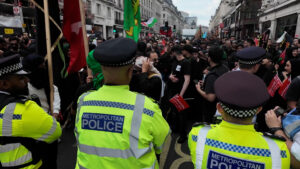
Elon Musk Weighs In A Controversial Perspective
Adding fuel to the fire, Elon Musk recently took to Twitter to highlight the apparent disparities in the UK’s justice system. He pointed out cases where individuals faced harsh penalties for minor offenses while others received lenient sentences for far more serious crimes, including sexual violence. Musk’s tweet referenced three cases that starkly contrasted with each other, questioning what he saw as a deeply flawed system. This public critique resonated with many who feel that the UK’s legal and political systems are failing to uphold justice impartially.
Musk also criticized Prime Minister Starmer for singling out the Muslim community in his response to the recent violence, asking why the same concern wasn’t extended to all communities affected by the unrest. This comment has amplified the debate about whether the government’s approach is truly equitable or if it favors certain groups over others.
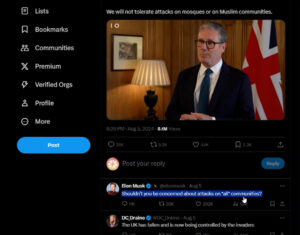
Conclusion
The current unrest in the UK is a complex issue with deep roots in societal fears and frustrations. While the government’s focus on far-right elements might seem like a straightforward response, it risks oversimplifying the situation and alienating large segments of the population. As the debate continues, it is crucial for both the media and political leaders to engage with the full spectrum of concerns being voiced by citizens across the country.
For a more in-depth exploration of these issues and to hear from those directly involved, we invite you to watch our informative video, “Silencing Concerns: British Citizens Branded as Far-Right.”
